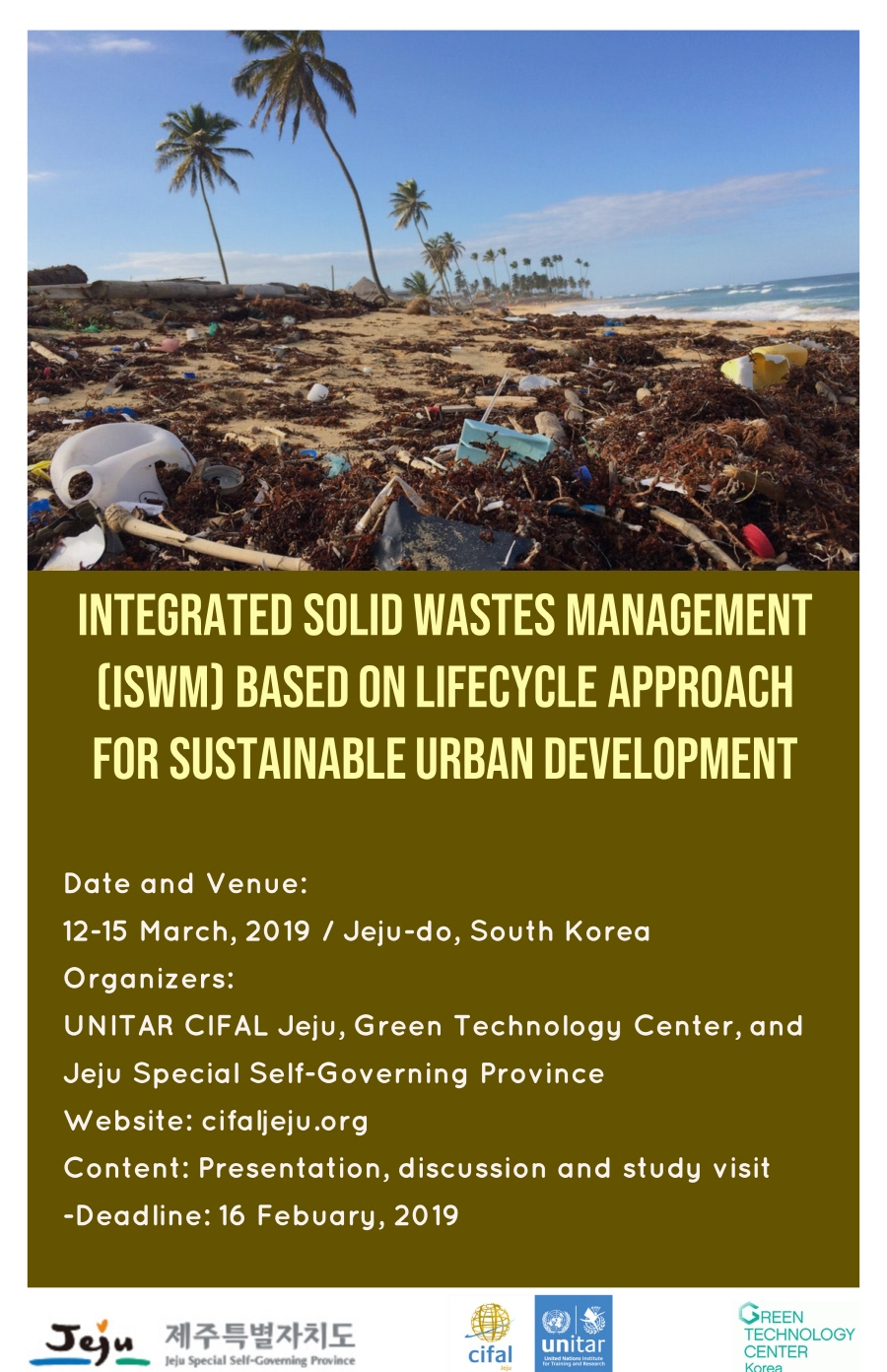
 2019.01.25
2019.01.25
|
WORKSHOP Integrated Solid Wastes Management (ISWM) based on
Lifecycle Approach for Sustainable Urban Development 12~15
March 2019 Jeju-do, Korea Background Integrated
Solid waste management (ISWM) is an integral part of the urban environment and
planning of the urban infrastructure to ensure sustainable and eco-friendly
living environment while considering the promotion of socioeconomic
development. Rapid urbanization, urban growth and economic development of the
developing countries in the Asia Pacific region has caused numerous problems of
waste disposal. It is further aggravated by the lack of technical capacity,
particularly in human resources trained in ISWM practices in the areas of waste
collection, transportation, processing, technology and disposal. An integrated
solid waste management system is strongly connected to three dimensions: urban
environmental health, the city planning/growth and resource management. According
to the Sustainable Development Goals (SDGs) framework, SDG Target 6.3 states
“By 2030, improve water quality by reducing pollution, eliminating dumping and
minimizing release of hazardous chemicals and materials, halving the proportion
of untreated wastewater and substantially increasing recycling and safe reuse
globally” Also, target 12.4 says “By 2020, achieve the environmentally sound
management of chemicals and all wastes throughout their life cycle, in
accordance with agreed international frameworks, and significantly reduce their
release to air, water and soil in order to minimize their adverse impacts on
human health and the environment” Lastly, target 12.5 emphasizes “By 2030,
substantially reduce waste generation through prevention, reduction, recycling
and reuse”. Sustainable Development Goal 12 (Responsible Consumption and
Production) focuses on lifecycle approach to reduce the waste and its impact on
environment while supporting quality of life. In
this regards, this capacity building workshop will provide participants with
opportunity to obtain a better understanding of waste management practices,
policies, and programs by cities and national governments to deal with waste
problems in their own countries. The
workshop is intended to be interactive, thus participants are highly encouraged
to share their own experiences, challenges, and opportunities for
collaboration. CIFAL Jeju will facilitate these discussions, and hope to
support the forging of new partnerships between participants. Event objectives This
overall goal of the course is to improve waste management practices, policies,
and programs by cities and national governments that ultimately contribute to
Greenhouse Gas (GHG) emission reduction at global level as well as to enhance
the understanding of the application of ISWM at local level. Participants will
learn about: innovations in waste management appropriate for the Asia Pacific
region; and Korea’s wastes management strategies and policies. Learning objectives To enable participants to: - Gain knowledge on Korea’s wastes management
systems and policies; - Understand the implication of integrated
solid wastes management (ISWM); - Analyse and compare the
technological gaps among countries with Korea’s technological trends in wastes
management; - Identify potential
wastes management needs of cities and villages; and - Select appropriate
wastes management approaches to establish a policy master plan. - Identify partners with
expertise and capacity to assist cities and national governments improve their
waste management practices Content and Structure The course content will
include the following topics: 1.
Introduction to
lifecycle approach to develop waste management strategy (UNEP) – Sustainable
Development Goal 12 2.
Urban Planning and
Waste Management Governance (Kyoto University, Dr. Ali Gul Quresh and Asian
Institute of Technology, Dr. Sohee Kim) – Sustainable Development Goal 11 3.
Integrated Solid
Waste Management Guidelines (developed by UNEP) 4.
Specific waste
streams – E-waste, plastics, healthcare waste, waste biomass 5.
How to develop
specific waste management plans based on city’s characteristics (group work)
with technological and financing applications Methodology The workshop will be comprised of: - Presentations and discussions - Self-assessment
exercise and group work - UNITAR ‘City-Share
methodology’ - Study visit Target Audience This workshop is open to those in central
and local government, non-profit and academic sectors in the Asia-Pacific
region who wish to implement integrated solid wastes management (ISWM) policies
and technologies in both urban and rural settings, or make their contribution
to reducing wastes and GHG. Requirement Selected applicants are
required to: - submit necessary
documents on time, i.e., registration form etc. - complete and submit
pre-training readings and assignments, i.e. case studies, self-assessment, etc. - participate actively in
the training program and be fluent in written and spoken English. Event detail Title: Workshop on
Integrated Solid Wastes Management (ISWM) based on Lifecycle Approach for
Sustainable Urban Development - Date and Venue: 12~15 March 2019 / Jeju-do,
South Korea, - Organizers: UNITAR
CIFAL Jeju, Green Technology Center, and Jeju Special Self-Governing Province - Content: Presentation,
discussion and study visit (A certificate will be
awarded at the end of the workshop.) Application and deadline Send the following 7 documents to cifaljeju.env@gmail.comby 16 February 2019 (Saturday): 1. Download forms or guidelines from www.cifaljeju.org (Notice →Upcoming events) 1.1. Application 1.2. Letter of nomination 1.3. Letter of commitment 1.4. Case study description (see guidelines) 1.5. Acknowledgement, waiver and release of
liability 1.6. Consent to collection, usage and
disclosure of personal information 2. Curriculum vitae (CV) –form of your own (※Late application will not be accepted.) |







